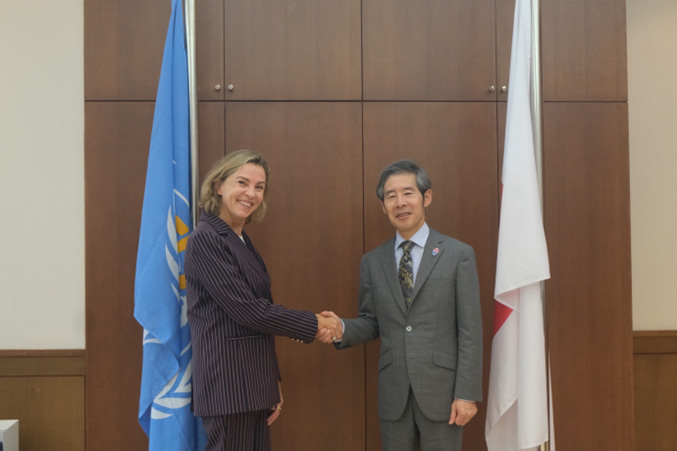 WHO Representative to Somalia Dr Reinhilde Van de Weerdt (left) met with H.E. Mr OKANIWA Ken, Ambassador of Japan to Somalia, to express appreciation for Japan’s support. Photo credit: WHO Somalia/M. Saydahmat12 June 2024, Mogadishu, Somalia – A critical project led by the WHO Country Office in Somalia aims to reach nearly 900 000 people with life-saving interventions over the course of 2024. The project targeting people in Somalia who are still living with the impacts of extreme climate events is supported by the Government of Japan with a generous grant of over US$ 700 000.
WHO Representative to Somalia Dr Reinhilde Van de Weerdt (left) met with H.E. Mr OKANIWA Ken, Ambassador of Japan to Somalia, to express appreciation for Japan’s support. Photo credit: WHO Somalia/M. Saydahmat12 June 2024, Mogadishu, Somalia – A critical project led by the WHO Country Office in Somalia aims to reach nearly 900 000 people with life-saving interventions over the course of 2024. The project targeting people in Somalia who are still living with the impacts of extreme climate events is supported by the Government of Japan with a generous grant of over US$ 700 000.
This new project follows the completion of an earlier project that benefited over 3 million people affected by drought and floods in Somalia with integrated health and nutrition services. This latest funding, allocated under the Japanese Supplementary Budget, thus represents continued support to Somalia from the Government of Japan.
The project is titled “Ensuring Access to Essential and Emergency Health Care for Drought (and Flood) -affected Communities Living in Hard-to-reach Areas in Somalia” and spans the entirety of 2024. It targets 15 flood- and drought-affected districts across the country. Working with the Ministry of Health and Human Services, WHO aims to mitigate the health impacts of recurrent climate shocks, food insecurity and disease outbreaks, especially cholera, while strengthening health system resilience.
“Japan’s continuous contribution will enable WHO to enhance our ongoing activities in responding to recurring and escalated cholera outbreaks in Somalia, particularly in areas affected by extreme weather events,” said Dr Reinhilde Van de Weerdt, WHO Representative to Somalia. “We are grateful for Japan’s longstanding support of our efforts to save lives and improve health outcomes in Somalia and the Greater Horn of Africa region, focusing on emergencies from COVID-19 to the drought and floods.”
Somalia has an ongoing cholera outbreak, which has been made worse since the floods of December 2023, which destroyed sanitation facilities and caused further displacements. Cholera spreads easily amid the poor sanitary conditions and limited access to basic health care. The outbreak is mainly concentrated in the Hirshabelle, Puntland, and South West states. Since January 2024, the country has reported over 9914 cases. Forecasts predict that the outbreak will continue due to anticipated heavy Gu rains expected until the end of June 2024, potentially leading to flash floods.
“The Government of Japan recognizes the urgent need to address the health challenges exacerbated by extreme weather events in Somalia,” said His Excellency Mr OKANIWA Ken, Ambassador of Japan to Somalia. “We are pleased to continue our partnership with Somalia. Through this project, we aim to support WHO’s efforts in delivering vital health care services, aiming to save lives and enhance resilience against the impacts of droughts and floods.”
Thanks to Japan’s funding, WHO will be able to improve access to essential health services through community-based interventions in underserved communities across 15 districts. These services will target 866 860 beneficiaries out of the almost 3.2 million people in need in those districts. The effort will focus on providing health and nutrition services, including immunization, for sick children and pregnant and lactating women.
The project will also strengthen referral linkages between communities and health facilities to improve quality, access and coverage of critical care. This includes in-patient treatment at stabilization centres for children with severe acute malnutrition with medical complications.
With Japan’s support, WHO will also assist the Ministry of Health and Human Services in strengthening prevention, early detection and prompt response to disease outbreaks, including cholera, at the district level.
For more information, contact:
Madinur Saydahmat, Partnerships Officer, WHO Somalia
Email:
Fouzia Bano, Communications Officer, WHO Somalia
Email:


